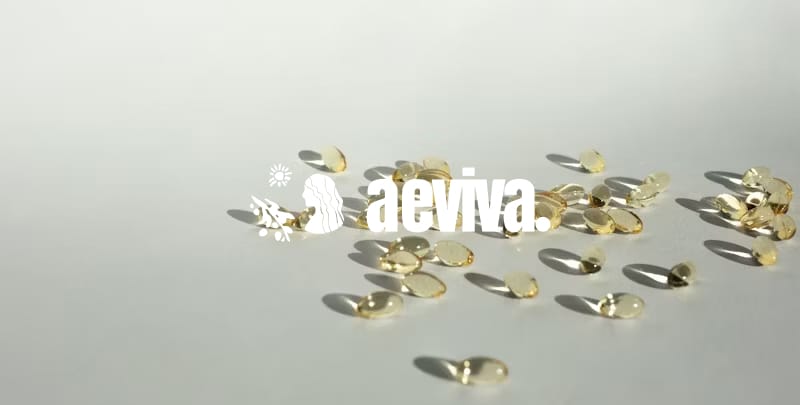- Aeviva
- Posts
- Think You Know Vitamin D? 🧐 5 Misconceptions That Might Surprise You
Think You Know Vitamin D? 🧐 5 Misconceptions That Might Surprise You
Vitamin D isn’t just about the sun. Discover the facts, the myths, and why you might not be getting enough.

Think You Know Vitamin D? The Myths You Shouldn’t Ignore
Vitamin D—often called the “sunshine vitamin”—is one of the most talked-about nutrients, especially for its role in bone health and immunity. But how much do we really know about it? Despite its popularity, misconceptions about vitamin D run rampant, leading many people to either over-supplement, under-supplement, or ignore it altogether. Let’s dive into the truth about vitamin D, uncover its benefits, and tackle the myths that might be keeping you from achieving optimal health.

America’s Most Loved Food Delivery Service
Hungryroot is a grocery and recipe delivery service that led millions of Americans to say goodbye meal kits, hello Hungryroot! Whether you're looking to eat healthier, stuck in a food rut, sick of grocery shopping, or looking to spice up mealtime, Hungryroot has got you covered.
Nutritious groceries + tasty recipes = the easiest way to eat healthy! Not only will you save hours planning, shopping, and cooking, Hungryroot customizes every delivery based on your food preferences, dietary restrictions, and health needs – putting your health goals on autopilot.
What Is Vitamin D?
Vitamin D is a fat-soluble vitamin that plays a vital role in many bodily functions. Unlike most vitamins, it acts more like a hormone, influencing everything from bone strength to immune function. There are two main forms:
Vitamin D2 (ergocalciferol): Found in some plant-based sources and fortified foods.
Vitamin D3 (cholecalciferol): Produced by your skin when exposed to sunlight and found in animal-based sources and supplements.
💡 Fun Fact: Vitamin D is activated in your liver and kidneys before your body can use it.
Benefits of Vitamin D
The benefits of vitamin D go beyond strong bones:
Bone Health: Helps your body absorb calcium, preventing osteoporosis and fractures. 🦴
Immunity: Boosts your body’s ability to fight infections, including respiratory illnesses. 🛡️
Mood Regulation: Low levels are linked to depression and anxiety.
Muscle Strength: Supports muscle function and reduces the risk of falls in older adults.
Heart Health: Emerging research suggests it may lower blood pressure and improve heart function.

image
Daily Dose and Sources
Daily Dose: The recommended intake varies, but most adults need around 600–800 IU (15–20 mcg) daily. For those with deficiencies, doctors often prescribe higher doses.
Natural Sources:
Sunlight: 10-30 minutes of sun exposure can meet your needs, but this depends on your skin tone, age, and geographic location.
Foods: Fatty fish (salmon, mackerel), egg yolks, fortified milk, and mushrooms exposed to UV light.
Supplements: A reliable way to ensure you’re meeting your daily needs, especially in winter or if you’re indoors a lot.
💡 Stat: Studies show that 42% of the U.S. population is vitamin D deficient.
Why Supplementing Vitamin D Is Important
For many, sunlight and diet alone aren’t enough. Factors like living in northern climates, using sunscreen, and having darker skin reduce your body’s ability to produce vitamin D naturally. Supplementing helps bridge this gap, ensuring your body gets what it needs for optimal function.

Symptoms of Vitamin D Deficiency
Lacking vitamin D can lead to:
Fatigue and muscle weakness 💤
Frequent infections
Bone pain and brittle bones
Depression or mood swings 😔
Hair loss
In extreme cases: rickets in children or osteomalacia in adults
💡 Fact: Vitamin D deficiency is more common than you think, with 1 billion people worldwide affected.
Common Misconceptions About Vitamin D
♦️Misconception #1: “I Don’t Need Vitamin D If I Spend Time Outside”
Reality: While sunlight is the best source of vitamin D, factors like wearing sunscreen, cloudy weather, and spending time in the shade can drastically reduce production. Plus, in winter months, sunlight isn’t strong enough in many regions to produce sufficient levels.
♦️Misconception #2: “Vitamin D3 and D2 Are the Same”
Reality: Vitamin D3 is significantly more effective at raising blood levels of vitamin D than D2. Most supplements now focus on D3 for better absorption and results.
♦️Misconception #3: “You Can’t Take Too Much Vitamin D”
Reality: Over-supplementing can lead to vitamin D toxicity, causing symptoms like nausea, weakness, and kidney damage. Stick to recommended doses unless your doctor advises otherwise.
♦️Misconception #4: “Vitamin D Is Only Important for Bones”
Reality: While vitamin D is crucial for bone health, it’s also vital for your immune system, mood regulation, and even muscle strength. It’s much more than just a “bone vitamin.”
♦️Misconception #5: “Foods Provide Enough Vitamin D”
Reality: It’s challenging to meet your daily requirements through food alone. Fatty fish, one of the best sources, only provides about 450 IU per serving, which is far below your daily needs.
Interactive Section: How Well Do You Know Vitamin D?

Test your knowledge! Answer True or False:
Vitamin D is produced naturally by your skin when exposed to sunlight.
Taking more vitamin D than recommended is completely safe.
Vitamin D can help regulate your mood and improve mental health.
All forms of vitamin D supplements are equally effective.
You can get enough vitamin D from diet alone without sunlight or supplements.
💡 Answers: 1) True, 2) False, 3) True, 4) False, 5) False
Vitamin D is a powerhouse nutrient that impacts nearly every system in your body. While it’s often misunderstood, knowing the facts can help you make better choices for your health. Whether it’s soaking up the sun, eating vitamin D-rich foods, or adding supplements, it’s worth ensuring you get enough of this vital nutrient.
Take-Home Message
Vitamin D is a fat-soluble vitamin that acts like a hormone, essential for bone health, immunity, and mood regulation. 🦴💪
The recommended daily dose is 600–800 IU, though many people need more due to deficiency.
Sunlight, fatty fish, egg yolks, and fortified foods are key sources, but supplementation is often necessary. ☀️
Symptoms of deficiency include fatigue, frequent infections, bone pain, and depression.
Misconceptions about vitamin D—like believing sunlight or food alone is enough—can leave you at risk.
Over-supplementation can cause toxicity, so stick to the recommended dosage unless advised otherwise.
Choosing Vitamin D3 is the best option for effective absorption and raising blood levels.


Reply